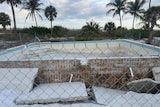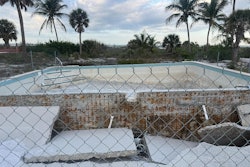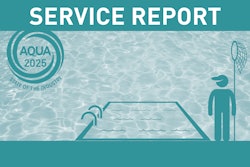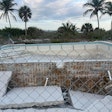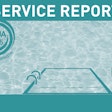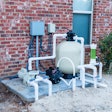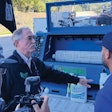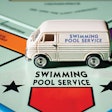1. One thing apparent from our survey was that the service sector has held up very well in a down economy. Has that drawn new people into service in your area?
Yes, we've seen that. As opposed to retailers opening up new service branches or new service startups, what we're seeing more of is builders getting into service because they're not building a lot of pools, and they need the work. Most of the shops that do retail around here already do service.
First it was builders getting into remodeling, and now we've got some builders or remodelers getting into the service end of it. They're going after the customers they built pools for, and they're getting a foot in the door by undercutting prices. And I see why. If I was in their position, that's a no-brainer.
When you're jumping into a business, that's about all you can do. That's the only way to penetrate somebody's customer base. You have no history, so you've got to offer to do it for less.
Out here, there are a couple of big builders like Mission Valley Pools and Mission Pools that are established builders with offices. But there are also a lot of builders that just work out of their houses. They sub out most of the phases of the job so they don't need a big yard and a lot of big equipment. Those guys were the first to drop off in the downturn and they're the type of guys we're seeing popping up in service trucks now.
2. So there's more competition in your area?
Well, the commercial stuff is getting more competitive, but those accounts always take more resources. And you're dealing with pools that tie up more resources to maintain and when you're dealing with a lot of management companies, it's all about price. But you can't have good quality at cheap prices.
So we've actually stuck to our guns and lost some commercial accounts on price. If we could lower our prices we would, but we can't. We've had to hold the line on quality of service.
3. How do you compete against lower-priced competitors?
Well, we tell our customers that we just don't compete with that. We ask them how a pole pusher can compete with our operation? Can he invite a customer over to his office? Does he have an inventory of warranty items that he can pull off the shelf? When they call does somebody answer the phone? Do they have a Web site? Do they understand safety in the pool and drowning prevention and how it involves the customer?
If a customer is interested strictly in price, then we're not the right company for them. But we've got a lot of good customers that we bend over backwards for. And we stay focused on that.
But we have a unique perspective on things. Take your typical service company in Southern California, usually it's a one- or two- or three-man band, often their big selling feature is a low price. With our company, we've been in business for about 25 years, and the way we run our business is based on the two-way loyalty street. It's part of our company culture. We have basically no marketing/advertising expense, historically. Instead of that, we just take care of our customers. If you do that, they're going to refer business to you.
And that's worked for us. We've not had a year without growth. (Now, that growth is pretty modest right now, and we have lost some customers in the recession but we've picked up more than we've lost.) But the point is that we instill in our employees the value of customer relationships. So that no matter how bad the economy is, your customers have some built-in loyalty.
4. Do you use GPS on your trucks?
Yes, we do, and it's helped us. We installed them last year, and we had a lot of dialogue with our guys about it, but now we know how much time we're spending on each house, and if our employees are speeding through their day, we can have a conversation about it.
It can work for your employees, too. I got a call last Friday from a customer that said, "Hey, our housekeeper said you were only here for five minutes." And I was able to look it up and say, "Nope, GPS says he was there for 23 minutes."
So it's really a way to become more efficient and save our jobs. We had a couple of interesting conversations in the beginning. But it gives us a different level of accountability than maybe some other companies have.
Because really, for someone doing a service route, there's a high level of trust involved, and great number of temptations.
5. Do you have a hard time finding good employees?
It kind of goes back to the work ethic. I wish people had more ambition than perhaps I've seen over the years, but at the same time, right now, we've got a really great workforce at my company. I'm blessed to have a crew like that.
But it doesn't matter what you're doing, whether you're building rockets or fighting a war or servicing swimming pools, you get what you tolerate in an employee.
When I think back in the early years, if you had a heartbeat and said you'd work there, you were hired! You'd take whatever walked in because you just didn't have a lot to pick from. But you ended up tolerating a lot of tardiness and repeated absences and sloppy work because you really didn't have a lot of options.
6. How have government regulations affected your company?
We deal with a lot of unlicensed contractors in Southern California, and that's always been a problem.
It's almost like a joke. We've always had a license and maintained it. And when we hire people, we withhold taxes and pay workmen's comp. It's not what every service company in Southern California does but it's the right thing to do. It's part of focusing on a certain clientele.
7. How have salt chlorine generators and variable-speed pumps impacted your business?
I think salt chlorine generators are fantastic. One thing that does annoy me is when a builder says, "Oh you put this thing in and then you don't need to do anything." There's a lot of misrepresentation that goes with them.
My sales pitch is this: "It's not going to save you any money. It's going to be one more thing you've got to maintain. When the cell goes out it's going to be expensive to replace. When you look at it over the course of its lifetime, it's going to cost a little bit more money than you're paying now.
"But what you get, in that time, is enhanced water quality."
My closing statement is this: "When you're done swimming in your pool, you don't feel like you need a shower." And that's when they say, "How much are they - I want one."
We're careful to run through all the costs with them and what they have to do. A builder might be a bit more apt to misrepresent the sale, but we have to continue to live with the customer.
As for variable-speed pumps, I'm 100 percent sold on them. I recently built my own pool, and I've got two of them, and prior to putting these things in, I thought, "Jeez, these things are way overpriced."
I was really kind of down on them. But then I put one on my pool, and I saw the difference in the wattage they consume, and did a total 180 on them. I became a much better salesman once I got one at my own home. I mean, yes, they're expensive, but do you want to turn your pump on and have that meter needle barely move or have it just whipping around?
8. Any changes for 2010?
We're figuring on growth next year. In 2009 we did a lot of things different. One, we finally put our logo and phone number on all our trucks. (Laughs) That's just business 101, but it really seems to have had an impact.
Last year we started a newsletter for our customers, with some links and some fun things in there that get them to think about salt chlorine generators and variable-speed pumps.
This can really help. I got a call from a customer that had a failed pump - and anytime that happens we're going to have the variable-speed pump conversation - but as I was talking to him I realized he was already an informed customer from having read the newsletter. He was already warmed up, which really helped.
Comments or thoughts on this article? Please e-mail [email protected].



















